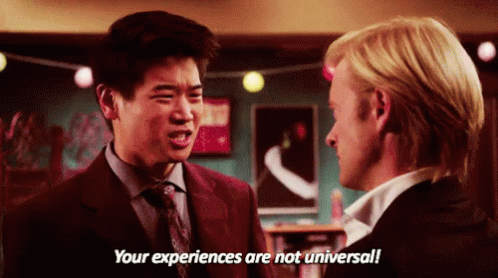Oldness is not a feeling, and young people are not a threat.
I’ve heard people of all ages claim they “feel old”. Sometimes when a colleague learns my age, and discovers that I am younger than they might have imagined, they tell me that I’ve made them “feel old”. Many of my childhood friends are now entering their 30s — whenever someone’s birthday comes around, there is talk of becoming old and feeling old. I’ve even heard 20-year-old students of mine say that they “feel old” as they plan their first-ever legal drink.
It seems there is no basement to what can count as old, and no restriction on who can feel old. It’s unclear in any of these contexts what “old” really means.
People “feel old” in response to all kinds of ridiculous things — from the rebooting of Hellboy, to the birth of a friend’s child. When we notice that people younger than us don’t share our pop cultural references, we say we feel old. When we realize our bodies are changing and can’t process alcohol the way they once did, we say we feel old. When I watched this video of Neil Cicierega talking about the flash videos and MIDI songs he created at 14, I thought I felt old, because I was comparing my adult self to his childhood accomplishments.
But in reality, none of these observations actually make us older. They don’t change the rate at which our bodies age. In fact, they have nothing to do with us. They just remind us that time exists and will never stop moving, which makes us feel insecure and afraid. And we label that insecurity and fear as “feeling old”.
Our culture associates being elderly with being weak, feeble-minded, irrelevant, sexless, and incapable of growth. So it’s no wonder that we throw around the phrase “I feel old” when something in the world leaves us feeling threatened, and like we are not enough. But in those moments, when someone younger than us is more accomplished than us, or our knees start hurting, or our Transformers joke falls flat, we don’t actually, really, “feel old”. And we need to stop using language that implies that we do.
There is no such thing as “feeling old”. To borrow a phrase from fat positive activists far wiser than I am, old is not a feeling.
Instead, when you say that you “feel old”, you probably mean one of the following things:
Your Body Is Changing & It Scares You
Our bodies change at every stage of our life cycle. We talk about development sometimes as if it is a linear, upward path towards a plateau called “adulthood”— but there is no point at which we become “fully adult”, no point at which our bodies stop shifting. Even after we reach legal adulthood, our brains are still changing and growing, and we may continue to exhibit post-pubescent hormonal changes in our bodies for many years to come.
In our late 20s and 30s, our bodies continue to change in various ways, losing muscle tone, readjusting fat stores, pruning some neural connections and gaining others. Since we are done growing (at least in terms of height), our metabolism changes and becomes a bit more efficient. We cease needing so many calories to sustain ourselves. We process substances more slowly.
As we continue aging beyond that, our minds and bodies become better at enduring pain. Our brains become better at thinking about life in terms of long-term consequences and goals. Our processing speed and reaction times slow, but we also become less brash. Our knowledge and wisdom increases.
These are all beautiful things! These changes help to make us more resilient, self-aware, and cautious. These are typical, expected consequences of living a full life. Yet we have been taught to hate and fear these changes, because these changes are associated with being old, fat, or disabled, and our culture hates old people, fat people, and disabled people.
Despite what we have all been taught, there is nothing innately bad or shameful about the fact that reaction time slows as we age. There is nothing wrong with the fact that as we age, our bodies almost always gain more body fat. There’s nothing evil or embarrassing about the fact that we lose physical strength as time marches on. We only find these things shameful and terrible because we have been taught that people who are slow, cautious, fat, or week are lesser than those who are not.
The fear of physical aging explains our culture’s current obsession with skincare, organic “clean” diets, punishingly rigorous exercise regimes, and so much more. We want to believe that if we pour enough money, effort, and superfruit into our bodies, we can halt the progression of time. But we can’t. And trying to do so only makes us feel more insecure and ashamed of our bodies. It doesn’t have to be this way.
Change can be confusing. It can be distressing when our bodies change outside of our control. And sure, it’s frustrating to go from being able to pound drinks all night long, to getting a persistent hangover after a single glass of wine. It’s fine to be a little startled by your first gray hair, the first pain you ever experience in your hip.
But that moment of surprise doesn’t need to warp into all-consuming, existential terror or self-hate. It doesn’t mean you need to “feel old”. You can learn to accept these changes as a natural, understandable effect of living a full life. Your body (and mind) are going to change. Change is the only reliable constant in life. And no matter how your body and mind shift, you are still a person of worth and beauty.
You’ve Realized Your Experiences & Tastes Are Not Universal
I started teaching college students when I was 23. My students weren’t all that far off in age from me, so I figured I’d be able to connect with them easily. Then one day I made an off-handed joke about the author John Green, and was met with only blank eyes and crickets.
Maybe John Green’s YA books weren’t the massive social media phenomenon I’d been lead to believe they were. Maybe my students weren’t as interested in the drama of the publishing world as I was. Maybe I’d just spent too much time on Tumblr, where hyper-specific attacks on small-scale web celebrities can warp your entire sense of what is and isn’t well known. Whatever the reason, I had mis-calibrated how common my tastes and experiences were. And it made me feel a little, well, old.
Of course, I didn’t really feel old. I had just realized my experiences weren’t universal.
…
A lot of my friends are movie buffs in their mid-30s. There are certain films they all hold very close to their hearts. They — and I — think of these films as iconic and timeless. Yet sometimes we encounter 20-somethings who have never even heard of the movies that mean so much to us. And then we get a bit outraged. What do you mean you’ve never seen The Breakfast Club? How could you have lived 25 years without seeing Edward Scissorhands?
It’s silly and very self-absorbed to assume that our generation’s cultural touchstones will be every person’s cultural touchstones. And it’s fundamentally short-sighted and even ageist to think that our generation’s media is the most significant, memorable media that there ever was. We should not be threatened, or made to “feel old”, when we discover that other people have different tastes and experiences than we do.
I’m not moved to tears by Sufjan Stevens’ Casimir Pulaski Day solely because of the song’s objective artistic merit. The song means a great deal to me because I discovered its beauty at a crucial time in my life. Scientific research suggests that we are hard-wired to emotionally connect with the music we discover in our teen years. We connect to the media we adored when we were young, when everything seemed novel, inspiring and fresh. Then we mistake that connection as an objective sign that art was better back in our day.
But the truth is, every generation has its own equally valuable art. Today’s children are watching shows (and Youtube videos) that will be a source of inspiration and nostalgia throughout the rest of their lives. Today’s young adults feel connected to music, movies, books, and TV shows that I might have missed entirely, or dismissed as being for “babies”. People who are older than me know to appreciate creative works I’ve never seen the beauty of, or maybe never even heard of. None of these preferences are objective facts.
When we discover that someone has different tastes and experiences from us, it can make us feel irrelevant. Time, which normally progresses slowly and gradually in the background, can seem to have jolted forward quite suddenly. And so, when I’m talking to a fellow Gorillaz fan and I realize he never got to see the original Kong Studios website, I might feel a pang of regret and loss.
It’s okay for these moments of realization to give us pause. It’s natural to make these little mental mistakes. But there’s no reason to overreact to it, or to lash out at the person whose tastes differ from ours. I don’t need to be outraged at my friend’s youthful unawareness. I don’t need to insult myself and other people by claiming I “feel old”. I can just reflect on this moment as a meaningful reminder that time continues to pass, wonderful art continues to be made, and my experiences are not everyone else’s.
In fact, these moments can inspire me to seek out wonderful creative works from eras other than my own. Rather than feeling small and irrelevant, I can choose to actively engage with all the new, beautiful things that have come into existence in recent years, or look back at art from decades before I was born. By connecting with other generations through the appreciation of their art, I can see that I am a valuable member of a huge tapestry of human history, and that can make the passage of time feel a lot less scary.
You’re Comparing Yourself to People Unnecessarily

Sometimes, when we say we “feel old”, what we mean is that we are threatened by the success of someone younger than us. That’s what the song I’m Losing My Edge by LCD Soundsystem (quoted at the top of this article) is all about. The narrator of the song reminisces sadly about his past concert-going experiences, lists all the records he’s bought and all the sights he’s ever seen, but he can’t seem to shake the fear of the kids who are “coming up from behind” him. He’s in a competition with these younger people, at least in his mind, and there is no winning:
I’m losing my edge. To better looking people, with better ideas, and more talent. Who are actually, really really nice.
Instead of being inspired by the new sounds and styles introduced by young musicians, the narrator of the song feels existential terror and loss. The delivery is tongue in cheek, but his emotions are deeply relatable. Who hasn’t taken the success of someone else personally? Who hasn’t felt the hot breath of an ambitious young self-starter on the back of their neck?
…
I was kind of a Wunderkind. Kind of. The youngest person in my graduate school class, I finished my dissertation at 25 years old. For the next few years, colleagues reacted to my age with palpable unease. Faculty would ask me if my students took me seriously. Administrators and staff would talk down to me until they realized what my credentials were. Once, during a job interview, a professor asked me if I was old enough to remember September 11th. Another professor playfully slapped him on the arm and reminded him that it was illegal to ask a job applicant their age. But the damage had already been done. In their minds I’d been labeled as immature, not fully formed. I was too young to be taken seriously.
Behind many of these insulting questions and dismissals, I detected a barb of insecurity. My age and accomplishments had made these professionals “feel old”. My students, who are mostly working adults, would sometimes make this veiled insecurity more explicit: they’d insult their own lives and everything they have accomplished, saying that compared to me they had done so little. And then they would call themselves old.
When people tell me things like this, I often point out that my academic progress came at the expense of other kinds of growth. While other people my age were working full-time jobs, building relationships, having children, partying, travelling the world, or going to therapy, I was in school. I accomplished something pretty cool in my mid-twenties, but I put off other experiences in order to do so. When I graduated, I was a workaholic with pretty low emotional intelligence and a ton of unprocessed trauma. My career was mature, sure, but inside I was very emotionally under-developed.
I have spent years playing catch-up, working to build the needed emotional and social skills that I neglected while I was working so hard to get a PhD. And I often encounter people who are much younger than me who have vastly better coping skills, communication skills, and relational abilities than I do. There are teenagers who astonish me with their self-knowledge, patience, gentleness, and emotional presence. Many of my younger students are far better versed on social justice issues, mental health advocacy, and activism than I was at their age, or ever will be.
I could feel threatened by how advanced younger people are. Their precocious wisdom could make me feel old. But mostly, on good days at least, I try to let their progress inspire me.
…
Our brains are highly social, and love to engage in comparisons. We learn about our own social status by contrasting our position with those of other people. We look to those we perceive as being “above” us, and we ignore the people over whom we have advantages.
This is not always a terrible thing. The success and drive of others can inspire us to work hard. A healthy sense of competition can motivate us to keep going. And sometimes we benefit from the universe giving us a sign that we have fallen behind in some key area.
But our tendency toward upward comparison can also damn us. It can make us blind to the privileges we have compared to those “below” us in social status. It can make us self-pitying, or fill us with shame. Our sense of healthy competition can metastasize into a persistent sense of threat, and leave us to see everyone as a menacing symbol of our own future death and irrelevancy. And that is not a fair way to look at someone who has lived a different life than we have, with different advantages, struggles, and goals.
When we “feel old” in the face of a young person’s accomplishments, we are exhibiting bad boundaries. The success of another person has nothing to do with us. It is not an indictment of us. We are all working at our own pace, with our own unique mixture of advantages and disadvantages. It is not a race.
Oldness is Not the End and Youth is Not a Threat

There is not a specific age at which a person becomes old. There is no singular physical experience that lets us know we are old. Being “old” is socially defined, and therefore highly relative to our surroundings and our society’s prevailing norms. Seeing “oldness” as scary, sad, or lonesome is not inevitable.
We’re all taught to fear aging; we’re all pressured to live very exciting, accomplished lives while our skin is still elastic and our brains are still unmyelinated. Society bombards us with images of youth as hopeful, energetic, sexy, and ambitious; our images of old age are sad, sallow, and weak. We are taught that our lives exist for the sake of productivity and that our bodies are objects that must be either beautiful or useful. Thus it is a tragedy for us to ever become incapable, or for our bodies to age.
We can break out of this pattern. We don’t have to define our worth by our number of wrinkles, our physical ability, or how much money we have made for the people that employ us. We don’t have to hate ourselves if our bodies become more frail, or if we can’t work anymore. The passage of time is not a threat to our worth as human beings, no matter how jarring it might be. The passage time is a normal aspect of existing as a human being. Older people are not pitiable. There is no reason to fear becoming more like them.
Furthermore, younger people are not coming to destroy us. They don’t want to tear apart our favorite books, drown out our favorite songs, rip every trophy from our hands and leave us alone in the wilderness to die. They simply want to exist, and to keep bringing joy and novelty into the world. Their youth is not what causes our aging. Their existence is what allows the world to continue to grow.
Other generations are not our enemies. Old age comes for all who live. Youth brings new vitality and beauty into society. If you see a fresh line on your forehead, or you hear a song on the radio that you don’t recognize, you don’t need to be threatened or sad. You can be thankful that life continues to progress. You can feel awe that you got to be a part of it.





